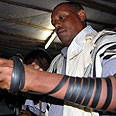
The participants are all members of a 2,000-strong community in Addis Ababa who claim Jewish lineage, but their very origins are doubted by authorities in Israel who believe they are imposters seeking entry under the guise of religion.
"We're ready to die until we get an answer," he says, hoping that a "long hunger strike" would draw attention to their poor living conditions and pave the way for "aliyah", the right to return to the promised land.
Over 100,000 Ethiopian Jews already live in Israel and Jerusalem recently granted entry to 7,800 Falash Mura more from only the northern town of Gonder, where many Ethiopian Jews originate from.
The Falash Mura see themselves as Jews, and say they were forced to convert to Christianity in Ethiopia and Israel has not accepted that all of them are Jewish.
Those in the Ethiopian capital say they were unfairly left out, dashing their hopes of reuniting with family members.
"All we want is to reunite with our families. Both my father and mother are in Israel along with my two sisters," said Fikirte Delele, a 33-year-old mother of two.
The group says its members moved from Gonder in the mid-1990s hoping to fast-track their aliyah after Israel resettled thousands of Ethiopian Jews in the 1980s.
But the dream of quick resettlement soon turned faded, and the new arrivals – mostly poor farmers and manual laborers – soon found themselves struggling to survive in Addis Ababa having sold all their meager belongings in rural Ethiopia.
Israel skeptical
Israeli officials, long skeptical about whether all Falash Mura are actually Jewish, have confirmed that those Falash Mura in Addis Ababa will not be part of the 7,800.
"Last month, the government of Israel decided to bring the last group of Falash Mura waiting in Gonder," Alon Unfus-Asif, spokesman at the Israeli embassy in Addis Ababa, told Reuters.
"This decision aims to be the last chapter of organized immigration from Ethiopia to Israel," Alon said.
Israel grants automatic citizenship to Jews who immigrate. Most Falash Mura must undergo a conversion ritual before receiving citizenship papers.
_wa.jpg)
Addis Ababa Jews. 'No one here to help us' (Photo: Reuters)
Since the 1990s, Ethiopia's tiny Jewish community has been supported by a handful of Western-based advocacy groups, mainly by providing Jewish education, organizing religious services, and food projects, but finances for some of them are running dry.
"We came to Addis after our parents, siblings, uncles, aunts and others left for Israel. We are suffering a lot as we have no one here to help us," Sisay Berhan, head of the Association of Ethiopian Jews in Addis Ababa, said.
Today, the Ethiopian community in Israel has grown to more than 100,000. The Jewish state airlifted its first Ethiopian Jews in the 1980s and 1990s following a rabbinical creed that ruled they were descendents of the biblical Dan tribe.
Isolated group
The Falash Mura have been an isolated group ever since they emerged in the region in pre-Christian times. Ancient records showed they were barred from owning land and hardly ever married outside the community. In modern times the legal constraints disappeared, but the separation persisted.
Even after they go to Israel however, the Falash Mura often face difficulties, including enrolling their children in schools. Others take long to fit into the Israeli society.
On August 30 last year, three private ultra-Orthodox institutions refused to admit Ethiopian students saying they needed to raise their academic standards, drawing the ire of Prime Minister Benjamin Netanyahu.
But members of the Falash Mura would rather settle in Israel at all costs, to flee life on the margins of Ethiopian society, and plan a string of measures to highlight their plight, including demonstrations in the capital.
"We have already been here for 13 or 14 years, and we will continue to make voices and fight until we are listened to. We want to go home," said unemployed 30-year-old Sintayehu Sidistu.
- Follow Ynetnews on Facebook















